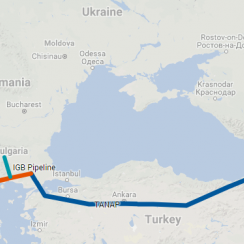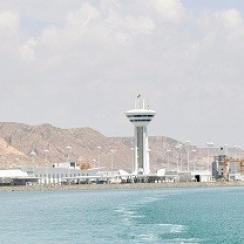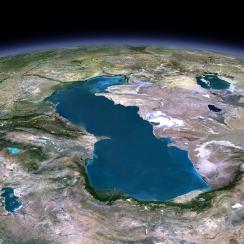Turkmenistan and the Great Silk Road
On May 2, 2018, two significant events took place on the Turkmen Shore of the Caspian Sea:
First, the International Forum “The Great Silk Road – towards the New Frontier of Development” was opened by the President of Turkmenistan Gurbanguly Berdimuhamedov. Second, the Forum was followed in the afternoon by the official opening of the Turkmenbashi International Sea Port.
Turkmenistan has always played and still plays a key role in the Great Silk Road Area. From geographical, energy resource, logistic and transport, trade and even political points of view, one should seriously consider Turkmenistan in the context of the Belt and Road Initiative. Just a few facts about Turkmenistan:
- 4th biggest reserves of natural gas in the world, just behind Russia, Iran and Qatar
- large onshore and offshore oil reserves
- dynamic development of its gas processing and oil refining capacities
- dynamic development of transportation and export capacities of its energy resources, such as natural gas and electricity (Central Asia – China Gas Pipeline; TAPI (Turkmenistan - Afghanistan – Pakistan – India) Pipeline; New 500 kilovolt Power Transmission Line in parallel to TAPI; TUTAP (Turkmenistan-Uzbekistan-Tajikistan-Afghanistan-Pakistan) electricity project
- developing transport infrastructure linking the South and East regions of the country to the Caspian Shore, thus enabling the access to the Caspian Sea to neighbouring countries Uzbekistan, Kyrgyzstan, Tajikistan and Afghanistan
There are three important developments of the late 2017 and 2018 which will enable Turkmenistan to be a valuable participant of the New Silk Road and an attractive investment, trade and business destination for European and Swiss companies:
- opening on May 2, 2018 of Turkmenbashi International Sea Port
- signature in October 2017 of the Legal Act of Turkmenistan on Free Economic Zones
- signature on August 12, 2018 of the Convention on the Legal Status of the Caspian Sea, which is opening the perspective for the building of the Trans Caspian Gas Pipeline, from Turkmenbashi to Baku
1. Turkmenbashi International Sea Port
The Port of Turkmenbashi on the Caspian Sea was already established in 1896. In August 2013, construction started of the new and modern Turkmenbashi International Sea Port with a budget of USD 1,5 billion. The new port covers an area of more than 105 hectares and consists of several units:
- ship building and ship repairing yard
- ferry and passenger terminal
- container terminal
- general cargo terminal
- bulk cargo terminal
- polypropylene terminal
According to Government officials, the new port facility will be able to service 300’000 passengers, 75’000 trucks, 4’000’000 tons of general cargo, 3’000’000 tons of bulk cargo, 120’000 tons of polypropylene and 400’000 containers (TEU) per year.
The new port is one of the largest on the Caspian Sea and is planned to be an important connection factor between the Europe, Middle East, Black Sea Region, South and South-Eastern Asia. This project is also developing the so-called, “Turkmenistan’s transport diplomacy” which is meant to increase the development of trade exchanges not only of Turkmenistan, but also of its land-locked neighbours Uzbekistan, Kyrgyzstan, Tajikistan and Afghanistan. According to the Ministry of Foreign Affairs of Turkmenistan, this should ensure the “successful integration of the region into international ties and creating a relevant transport, transit and communication system”.
2. The Legal Act of Turkmenistan on Free Economic Zones (FEZ)
On October 10, 2017 the “Law on Free Economic Zones (FEZ)” was signed by Turkmenistan’s President. This Law is a declared instrument aimed for the implementation of measures to modernize, diversify and strengthen the export potential of the national economy. It determines the legal, organizational and economic basis for the creation, functioning and liquidation of free economic zones in Turkmenistan.
In the system of international economic relations, FEZ are among the key factors of rapid economic growth, which is achieved through the exchange of information and technologies, deepening of integrational economic processes, mobilization of investments and increasing international trade. It is expected that the Law on FEZ should create a secure, transparent and competitive legal, tax and business environment in order to attract foreign companies and investors in Turkmenistan.
The successful implementation of the concept of the creation of FEZ in Turkmenistan will make it possible to attract foreign capital and technologies, facilitate the inflow of foreign currency, create new production of goods facilities thus, saturating the domestic consumer market as well as increasing the exports.
The Implementation of the Law on FEZ and the opening of the modern Turkmenbashi International Sea Port can be perceived as a signal of creation of an appropriate legal and business environment by Turkmen Authorities to international partners and potential future foreign investors and foreign business and trade partners. These developments could be especially interesting for Swiss companies from such sectors as Oil and Gas Equipment, Technology and Servicing, Transportation and Logistics, Food Processing, Textile, Pharma, Plastic Industry and others. On the one hand, FEZ should provide competitive legal and production solutions, access to commodities and local market and, on the other hand, the Turkmenbashi International Sea Port should, among others, enable the access to foreign markets for the export of goods and services produced in the FEZ. In this context, it is worth making the parallel with the Port of Baku and Alat Free Trade Zone.
3. The Convention on the Legal Status of the Caspian Sea and Trans Caspian Gas Pipeline
On August 12, 2018 the five Caspian littoral countries Azerbaijan, Iran, Kazakhstan, Russia and Turkmenistan signed the Convention on the Legal Status of the Caspian Sea (hereinafter Convention). The legal status of the Caspian Sea was unresolved since the collapse of the Soviet Union and the signature of the Convention was adopted after more than 20 years of disputes and negotiations. The participants to the Convention found an innovative solution, qualifying the Caspian Sea neither as a sea, nor as a lake. Among different aspects treated by the Convention, one is particularly drawing our attention in the context of this article: the treaty is removing the legal barrier to build a Trans Caspian Gas Pipeline from Turkmenistan to Azerbaijan.
Since the end of the 1990s, different projects of Trans Caspian Gas Pipeline were studied by Turkmenistan, Azerbaijan, Kazakhstan and the European Union. Due to the lack of clarity over the Caspian legal status and the opposition of Russia and Iran, all projects failed to realize. Now, according to the Convention on Legal Status of the Caspian Sea, only Turkmenistan and Azerbaijan need to agree on the development and construction of the pipeline. Previously, all five countries would have to approve its construction.
The Trans Caspian Gas Pipeline would be a 300 km gas pipeline along the bottom of the Caspian Sea from Turkmenbashi to Sangachal terminal in Azerbaijan. This pipeline should transport a volume of up to 30 billion cubic metres (bcm) of Turkmen gas per year, feeding the Southern Gas Corridor.
Turkmenistan has significant gas reserves. According to the 2018 BP Statistical Review of World Energy, at the end of 2017 the proven natural gas reserves of Turkmenistan were of about 19,5 trillion cubic metres, with the country ranking 4th as gas reserves and 9th among the gas producing countries. By 2030, Turkmenistan plans to increase its gas production to 250 bcm per year. For a comparison, the demand in EU is about 460 bcm per year.
The Trans Caspian Gas Pipeline is seen as a further component of the Southern Gas Corridor – a network of gas pipelines, conveying natural gas from Azerbaijan to Southern Italy and further to Europe, via:
- South Caucasus Gas Pipeline (SCPX) - Azerbaijan and Georgia
- Trans Anatolian Pipeline (TANAP) – Turkey
- Trans Adriatic Pipeline (TAP) – Greece, Albania, Adriatic Sea, Italy
The Trans Caspian Gas Pipeline is of a great interest for the EU in terms of diversification of its gas supplying sources. The European Commission has confirmed the Trans Caspian Gas Pipeline as one of the EU’s Projects of Common Interest. This qualifies the pipeline for financial support. In March 2018, the European Commission approved the funding of the Pre-FEED, Reconnaissance Surveys and Strategic and Economic Evaluations of the Trans-Caspian Gas Pipeline (“FEED” is a technical abbreviation for “Front-End Engineering and Design”).
For Turkmenistan, the Trans Caspian Gas Pipeline is an important opportunity to sell its natural gas to European markets, thus diversifying its export destinations. The existing inland East – West Gas Pipeline, connecting the Galkynysh Gas Field (ranking second biggest in the world, with estimated gas reserves between 4 and 14 trillion cubic metres and proven commercial reserves of 2.8 trillion cubic metres) to the Caspian Shore of Turkmenistan, should feed the Trans-Caspian Gas Pipeline. Opening of new export markets for natural gas from Turkmenistan would also be a trigger to increase the production of natural gas in the country and a further factor for economic development.
Potential interest of Switzerland in the Trans Caspian Gas Pipeline
As already mentioned, the EU has a clear and strong interest in developing the Trans Caspian Gas Pipeline and integrating it into the Southern Gas Corridor pipeline network. The EU also made concrete steps in this respect. During the visit of Angela Merkel in Azerbaijan on August 25, 2018 the German Chancellor and the President of Azerbaijan, Ilham Aliyev, discussed the topic of the construction of the Trans Caspian Gas Pipeline.
What about Switzerland? Is the Trans Caspian Gas Pipeline project of interest for the Confederation and for Swiss companies? In order to answer this question, the following aspects should be taken into consideration:
- the natural gas account for about 12,5% of the energy consumption in Switzerland
- Switzerland is importing 100% of the natural gas it needs
- as a major transit country in the heart of Europe, Switzerland is very well integrated into the European natural gas transport network and also has a widespread domestic transport network
- with the ban on nuclear and coal energy production, the demand for natural gas could increase
The TAP (Trans Adriatic Pipeline) portion of the Southern Gas Corridor is a project that was initiated in 2003 also by the Swiss company EGL (Elektrizitäts-Gesellschaft Laufenburg), now part of the Axpo Group. Trans Adriatic Pipeline is owned and managed by the company TAP AG, based in Baar, in the canton of Zug. At the beginning, Axpo was detaining 42,5% in TAP AG. Its stake was subsequently reduced to 5%. The other stakeholders of the Trans Adriatic Pipeline are the State Oil Company of Azerbaijan Republic, SOCAR (20%), BP (20%), the Italian company Snam S.p.A. (20%), the Belgian company Fluxys (19%) and the Spanish company Enagas (16%).
During the launch of the TAP project in June 28, 2013, Minister Johann Schneider–Ammann, Head of the Federal Department of Economic Affairs, said that “the project is important for Switzerland as we are dependent of oil and gas. The new pipeline will boost the security of supply and, moreover, a Swiss company is taking part”. In this context it won’t be wrong to say that any pipeline or other infrastructure project intending to increase and diversify the supply of gas to Europe can be considered as contributing to the security of energy supply in Switzerland. The Trans Caspian Gas Pipeline is, for sure, such a project and can not be without interest for Switzerland.
Interested in knowing more about these projects and how your business can benefit? Don’t hesitate to contact our consultant responsible for this area, Michael Kühn for further information and personal assistance.









